- The following is content from the press release -
The largest postpartum care hotel in Japan, "MARM GARDEN HAYAMA" (operated by the Karaoke Pasela Group)https://www.mom-garden.jp/(Head office: Shinjuku-ku, Tokyo; President: Mutsumi Saito), operator of the "Moms" website, conducted a survey of 101 job-hunting students who have not yet experienced childbirth, and asked them about their attitudes toward childbirth.
■Survey Summary
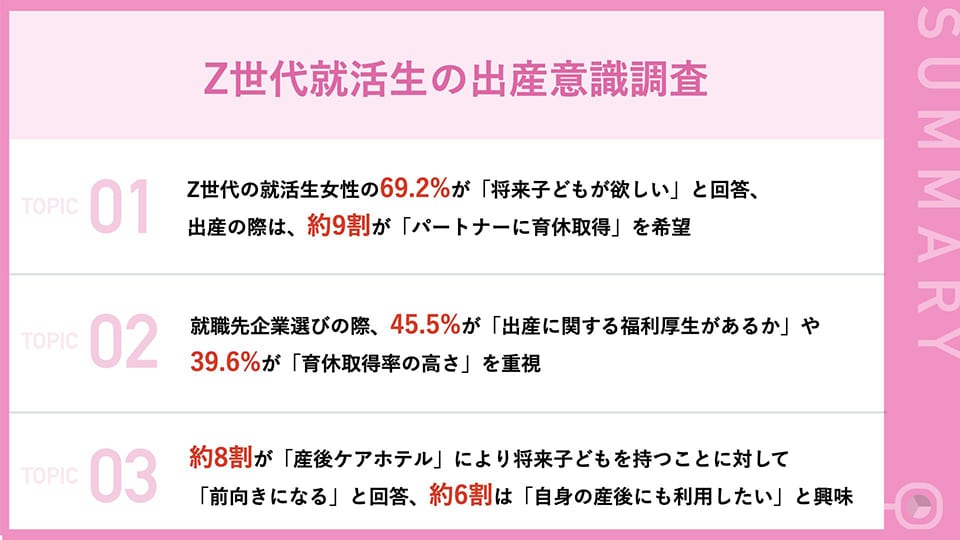
What is the ■Z Generation?
Millennials", "Generation Z", "Generation Alpha". Generation Z" is generally regarded as the generation born between the mid-1990s and the beginning of 2010s, and is also considered to be the generation that has entered society. We actually conducted a survey.
■Survey Summary
Survey outline: Attitude toward childbirth among Generation Z job-hunting students
Survey method: Internet survey
Survey period: May 18, 2022 - May 19, 2022
Valid responses: 101 job-hunting students who have not yet had a baby
Approximately 70% of job-hunting families in Generation Z answered, "I want to have children in the future.
Q1. Do you want to have children in the future?(n=101) when asked,Unwanted" and "Somewhat wanted" were selected as "Unwanted" and "Unwanted" were selected as "Unwanted" and "Somewhat wanted" were selected as "Unwanted" and "Somewhat wanted" were selected as "Unwanted".The answer was "yes.
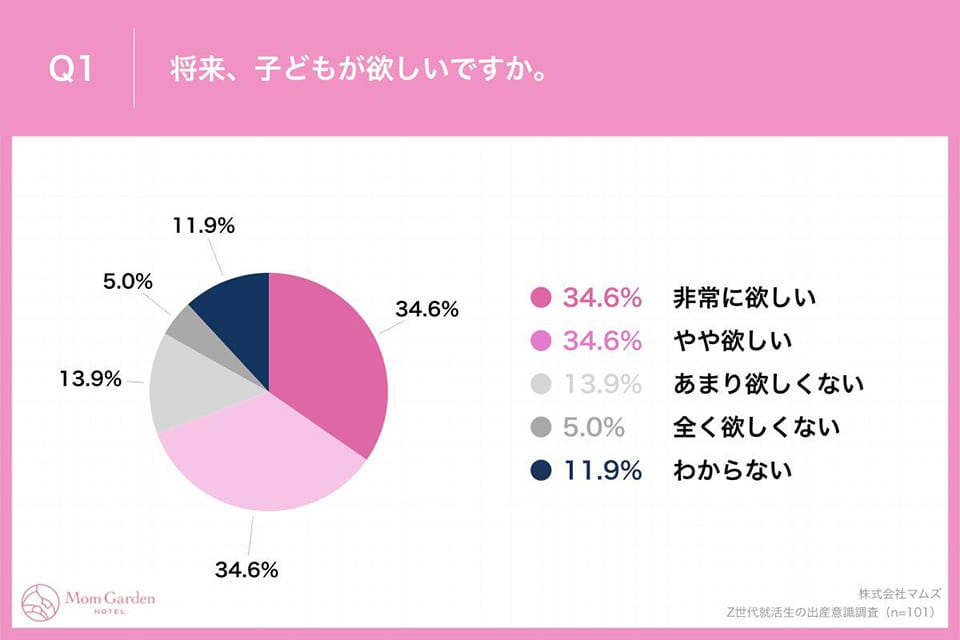
- Unpopularly desired: 34.6%
- Slightly want: 34.61 TP6T
- Not very much wanted: 13.91 TP6T
- Not wanted at all: 5.0%
- Don't know: 11.91 TP6T
The number of children desired, "2" was the highest at 77.11 TP6T
To those who answered "not applicable" or "somewhat applicable" in Q1,Q2. How many children do you want?
(n=70) when asked,77.11 TP6T for "2s" and 18.61 TP6T for "3sThe answer was "yes.
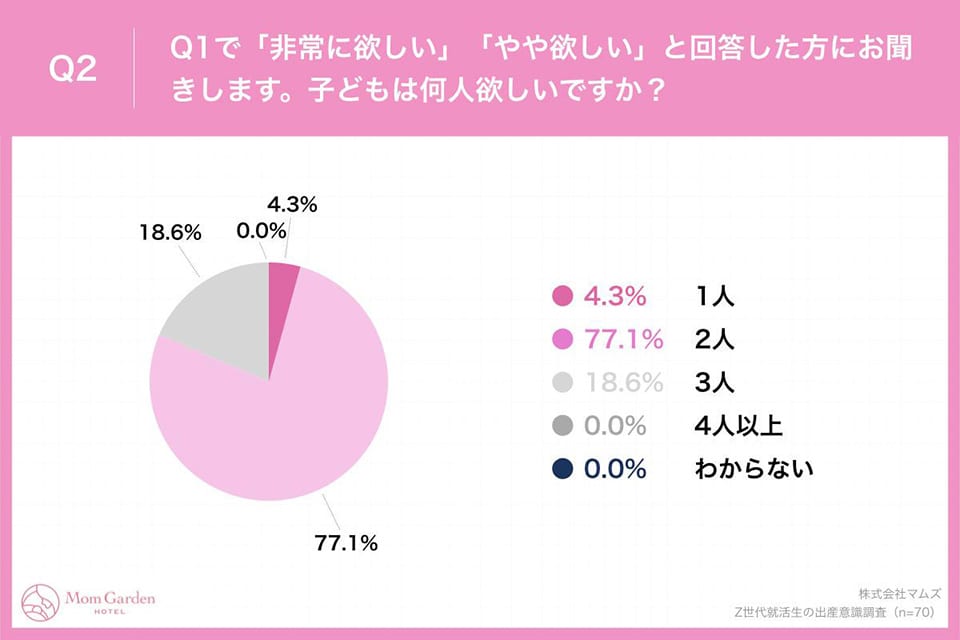
- 1 m: 4.3%
- 2 males: 77.1%
- 3 males: 18.6%
- For 4 or more persons: 0.0%
- Do not know: 0.0%
Reasons for not wanting to have children, concerns about "the financial cost of raising children" and "psychological and physical burden".
For those who answered "not so much" or "not at all" in Q1Q3. What is the reason for this? (Multiple answers)"(n=19) when asked,78.91 TP6T for "It seems like it will cost too much money to raise children," 63.21 TP6T for "I don't think I can stand the psychological and physical burden of raising children," and 42.11 TP6T for "The social environment is not conducive to allowing children to grow up freely (infectious diseases, childcare support system, disaster, etc.).The answer was "yes.
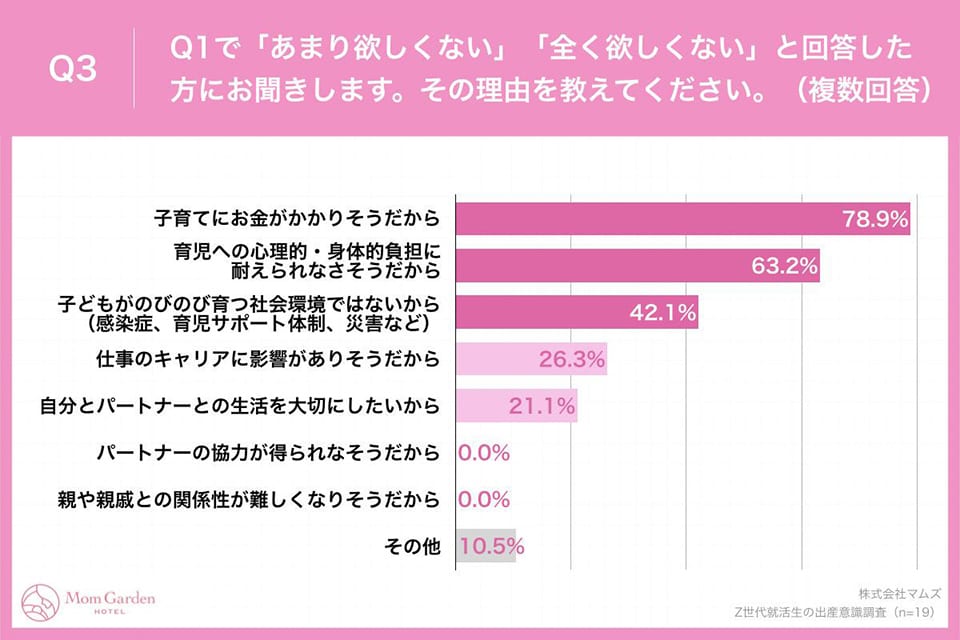
- Because it would be expensive to raise a child: 78.9%
- Because the psychological and physical burden of childcare seems unbearable: 63.2%
- Because the social environment is not conducive for children to grow up freely (infectious diseases, childcare support system, disasters, etc.): 42.1%
- Because it might affect my work career: 26.31 TP6T
- I value my own life and that of my partner: 21.1%
- Because it seems unlikely that the partner will cooperate: 0.0%
- Because relationships with parents and relatives will be difficult: 0.0%
- Other: 10.5%
■About 90% of respondents hope that their partner will take maternity leave when they give birth.
Q4: "Assuming you were to give birth, would you want your partner to take maternity leave?"(n=101) when asked,37.6% want them to take maternity leave (about one month to two months) and 34.7% want them to take maternity leave (about six months).The answer was "yes.
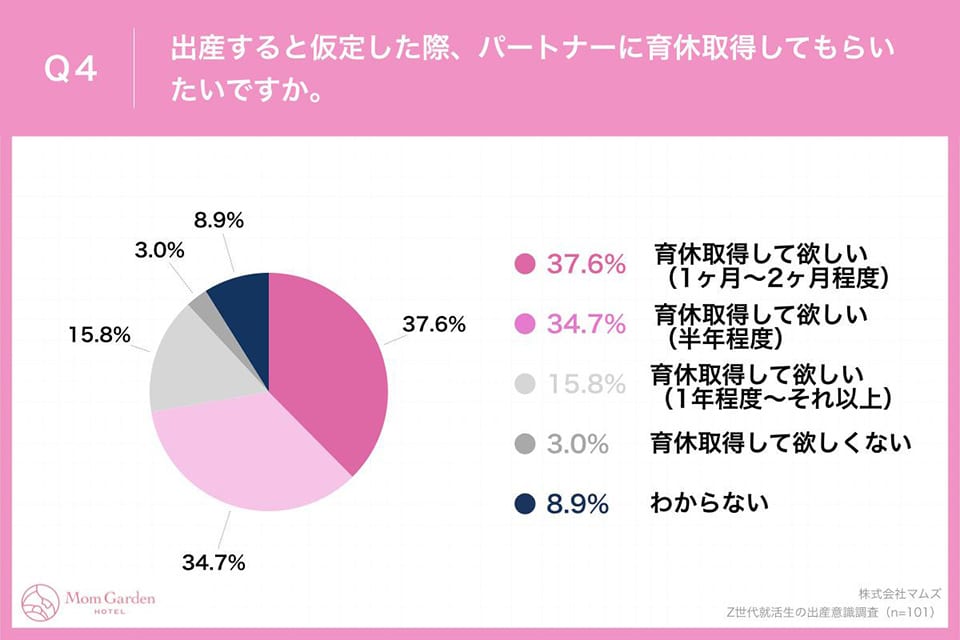
- I want my child to take maternity leave (for one month or two months): 37.6%
- Want maternity leave (about 6 months): 34.71 TP6T
- Want maternity leave (about 1 year to more): 15.81 TP6T
- Do not want maternity leave: 3.0%
- Don't know: 8.91 TP6T
45.5% and 39.6% selected "availability of maternity benefits" and "high rate of maternity leave" as the main factors in selecting a company to work for.
Q5. What do you consider important when choosing a company to work for? (Multiple answers)"(n=101) when asked,In addition to "Good atmosphere at work" (73.3%), "Availability of maternity benefits" (45.5%) and "High rate of maternity leave" (39.6%)The answer was "yes.
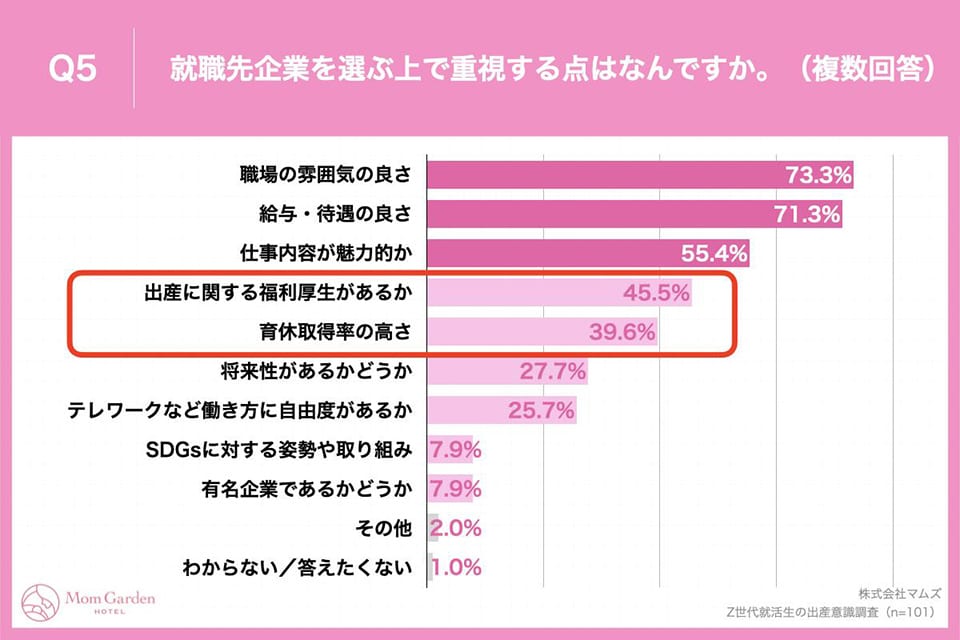
- Good work atmosphere: 73.3%
- Salary and benefits: 71.31 TP6T
- Is the work attractive: 55.41 TP6T
- Are there maternity benefits: 45.5%
- High rate of maternity leave: 39.6%
- Whether it has potential: 27.71 TP6T
- Freedom in the way you work, such as teleworking: 25.71 TP6T
- Attitude toward and commitment to the SDGs: 7.91 TP6T
- Whether the company is well-known or not: 7.91 TP6T
- Other: 2.0%
- Don't know/don't want to answer: 1.0%
83.2% respondents answered that they are anxious about the postpartum period.
Q6: "Assuming you are going to give birth, do you have any concerns about the postpartum period?"(n=101) when asked,The responses were 41.21 TP6T for "unfavorably anxious" and 41.61 TP6T for "somewhat anxious.
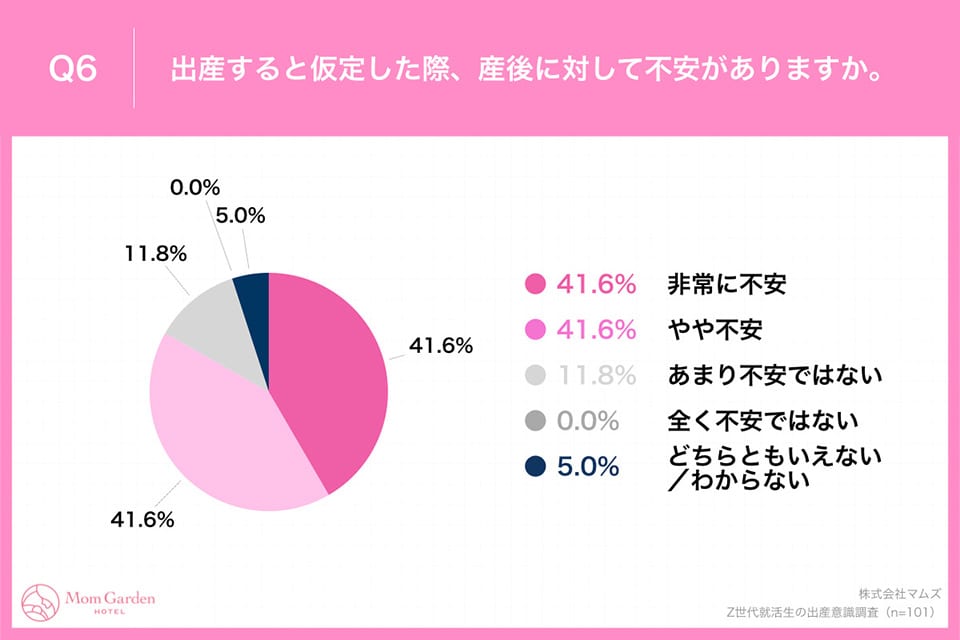
- Unpaired anxiety: 41.61 TP6T
- Slightly anxious: 41.61 TP6T
- Not very anxious: 11.81 TP6T
- Not anxious at all: 0.0%
- Can't say/ don't know: 5.0%
■ Postpartum anxiety, "Anxiety about childcare" was the most common at 73.81 TP6T.
To those who answered "not familiar" or "somewhat concerned" in Q6Q7. What are your concerns about the postpartum period? (Multiple answers)"(n=84) when asked,Anxiety about childcare" was 73.81 TP6T, "Anxiety about expenses for childcare after childbirth" was 53.61 TP6T, and "Anxiety about damage to the nave after childbirth" was 51.21 TP6T.The answer was "yes.
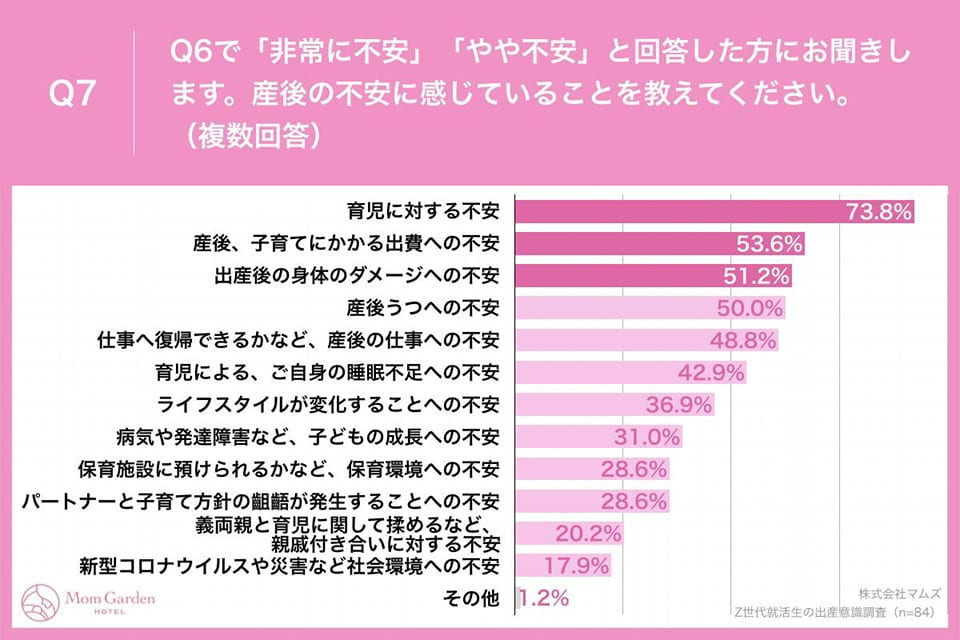
- Anxiety about childcare: 73.81 TP6T
- Anxiety about expenses for childbirth and raising children: 53.6%
- Anxiety about damage to the nucleus after childbirth: 51.2%
- Anxiety about postpartum depression: 50.0%
- Anxiety about postpartum work, such as whether they will be able to return to work: 48.81 TP6T
- Anxiety about their own lack of sleep due to childcare: 42.9%
- Anxiety about changing lifestyle: 36.91 TP6T
- Concerns about their children's growth, such as illness or developmental disabilities: 31.0%
- Concerns about the childcare environment, such as being able to leave the child at a childcare facility: 28.61 TP6T
- Anxiety about discrepancies in parenting policy with partner: 28.6%
- Anxiety about social interactions with relatives, such as disputes with in-laws about childcare: 20.2%
- Anxiety about social environment such as new coronavirus and disasters: 17.91 TP6T
- Other: 1.2%
■Other concerns such as "postpartum diet" and "vague anxiety
To those who answered "not familiar" or "somewhat concerned" in Q6Q8. Please tell us freely if you feel any anxiety after childbirth other than those mentioned in Q7. (Free answer)"(n=84) when asked,Postpartum weight loss" and "vaguely anxious."We received 54 responses, including
<(Free answer, excerpts)
- Age 21: Postpartum weight loss.
- Age 21: Vaguely anxious.
- 23 years old: Will they be able to provide adequate childcare and raise their children?
- Age 22: I am not sure if my partner will take the initiative to do housework and childcare.
- Age 22: Impact on work.
- Age 22: Loss of time for self.
- Age 22: Mom's friend.
About 60% hesitate to have children in the future due to anxiety about the postpartum period.
Those who answered "unfavorable" or "somewhat unfavorable" in Q6Q9: Do you feel hesitant about having children in the future because of postpartum anxiety?(n=84) when asked,The respondents who answered "unfavorable" and "somewhat unfavorable" were 14.31 TP6T and 45.21 TP6T, respectively.
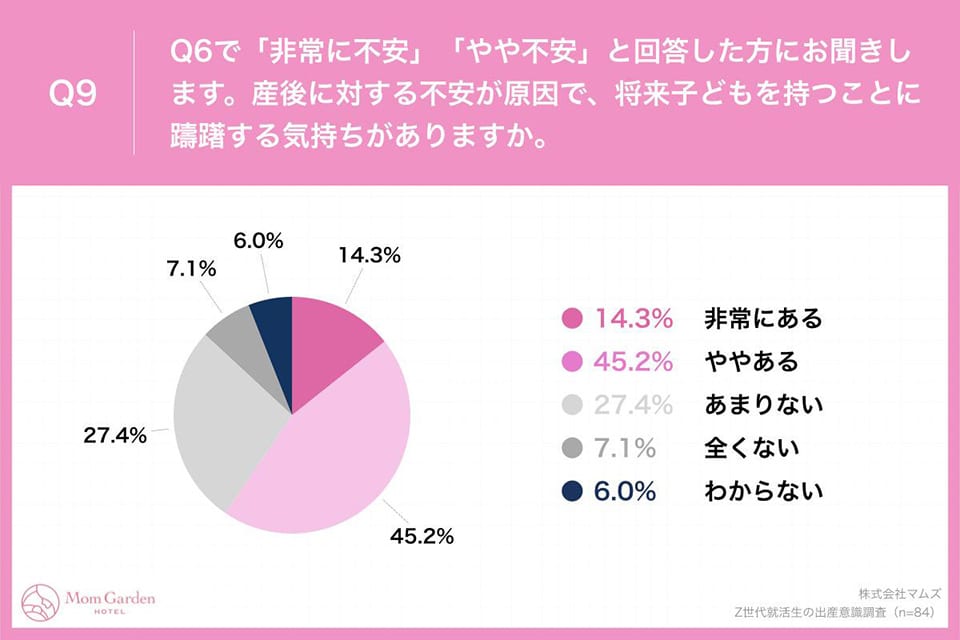
- Not in use: 14.3%
- Slightly Yes: 45.21 TP6T
- Not much: 27.41 TP6T
- Not at all: 7.11 TP6T
- Don't know: 6.0%
About 80% of respondents answered that "postpartum care hotels" made them "more positive" about having children in the future.
To those who answered "not familiar" or "somewhat concerned" in Q6,Q10: Would you be more positive about having children in the future if postpartum anxiety is reduced by a "postpartum care hotel" that provides 24-hour support for the care of the newborn while providing care for the nucleus after birth?(n=84) when asked,16.71 TP6T for "unfavorably agree" and 58.31 TP6T for "somewhat agree".The answer was "yes.
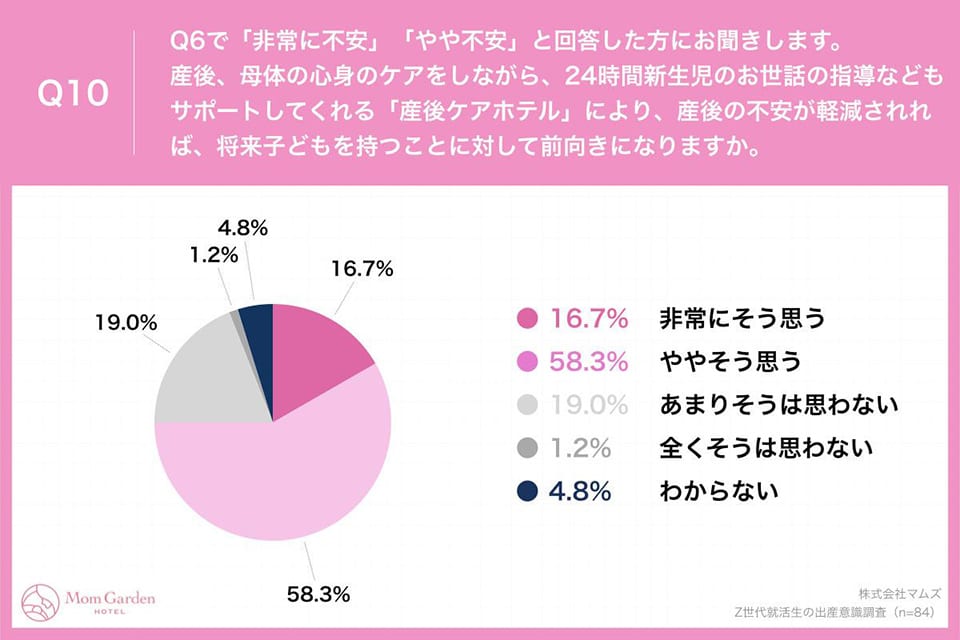
- Unpopularly so: 16.71 TP6T
- Somewhat agree: 58.31 TP6T
- Not so much: 19.0%
- Not at all: 1.2%
- Don't know: 4.81 TP6T
60.31 TP6T are interested in using a "Postpartum Care Hotel" for their own nucleus after childbirth.
Q11. Assuming that you will give birth, would you like to use a "postnatal care hotel" that provides 24-hour care for the newborn while taking care of the nasal cords after childbirth?(n=101) when asked,5.9% "Want to use it very much" and 54.4% "Want to use it".The answer was "yes.
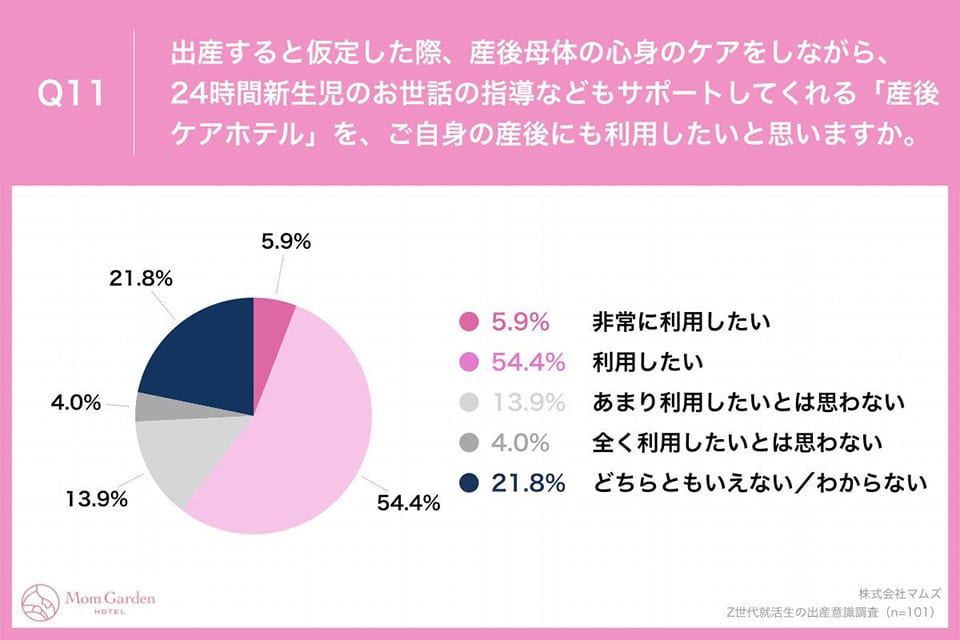
- I want to use it without fail: 5.9%
- Want to use: 54.4%
- Not very interested in using it: 13.9%
- Do not want to use at all: 4.0%
- Can't say/ don't know: 21.81 TP6T
The most common reason, at 57.4%, was "I feel that I will not be able to lead a daily life due to fatigue and unstable mental condition after childbirth.
To those who answered "definitely want to use" or "want to use" in Q11Q12. What is the reason for this? (Multiple answers)"(n=61) when asked,57.4% and 55.7% chose "I will be able to sleep well because I can take care of the newborn 24 hours a day" and "I will be able to sleep well because I can take care of the newborn 24 hours a day.The answer was "yes.
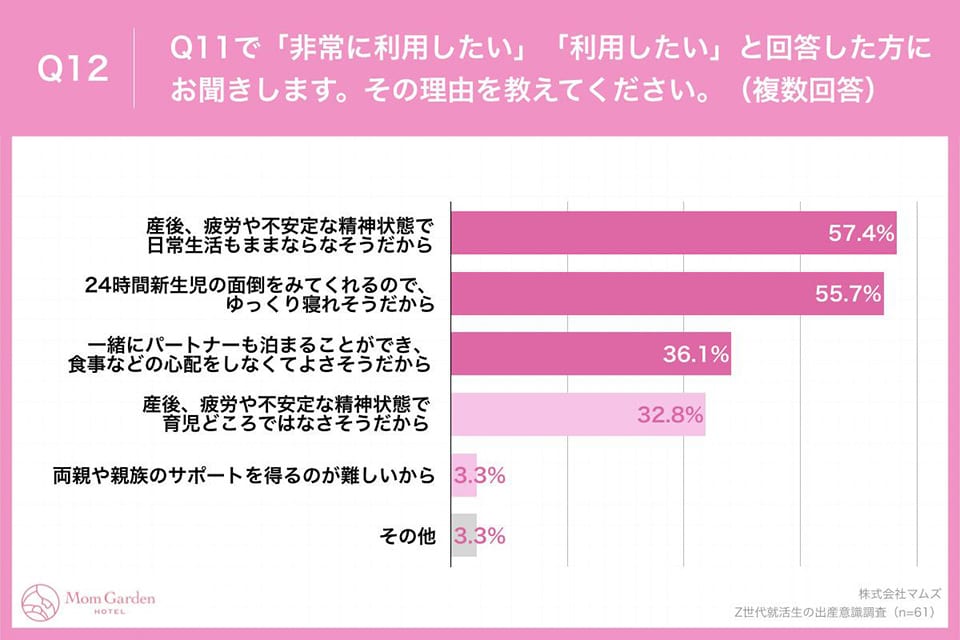
- I will not be able to lead a daily life due to fatigue and unstable mental condition after childbirth: 57.4%
- I will be able to sleep well because I will be able to take care of my newborn baby 24 hours a day: 55.7%
- Because I can stay with my partner and do not have to worry about meals: 36.1%
- After childbirth, it seems that fatigue and unstable mental state make it difficult to raise children: 32.8%
- Because it is difficult to get support from parents or relatives: 3.31 TP6T
- Other: 3.3%
■ Summary
The key factor for selection of a company by students who graduated from job hunting in Generation Z was found to be the level of concern for childcare, with 45.5% for "availability of maternity benefits" and 39.6% for "high rate of childcare leave".
This time, we conducted a "Survey on Attitudes Toward Childbirth among Generation Z Job Hunters," targeting 101 job-hunting students who graduated from the 23rd grade of Generation Z and who have not yet experienced childbirth.
First, about 70% of students and families in Generation Z answered that they "want to have children in the future" and the most desired number of children was "two" at 77.1%. On the other hand, when those who answered that they "do not want children very much" or "do not want children at all" were asked the reason, 78.91 TP6T answered "Because it seems to cost money to raise children" and 63.21 TP6T answered "Because I do not think I can bear the psychological and physical burden of raising children.
Next, it was revealed that about 90% of the respondents hoped that their partner would take maternity leave, with 37.51 TP6T of the respondents hoping for "about one month to two months", followed by 34.71 TP6T for "about six months". When choosing a company to work for, approximately 50% of the respondents placed importance on "whether the company offers maternity benefits" and 40% placed importance on "whether the company has a high rate of maternity leave.
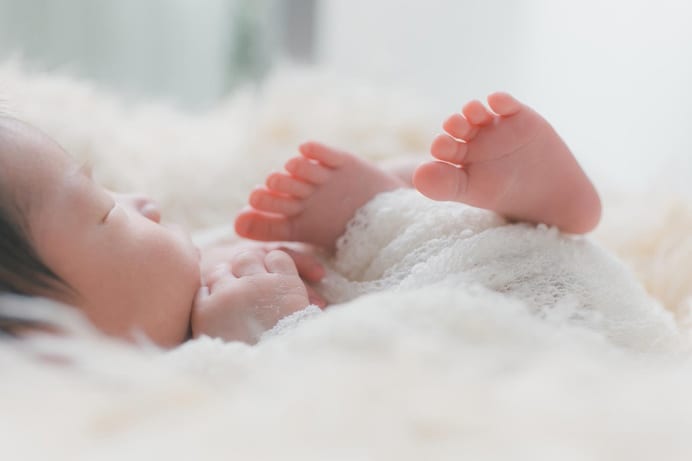
Next, 83.21 TP6T felt "anxious about the postpartum period" when assuming that they would give birth, and as a specific item, 73.81 TP6T had "anxious about childcare". Furthermore, approximately 60% of those who felt "anxious about the postpartum period" also answered that they were hesitant to have children in the future because of this anxiety.
We asked those who felt "anxious about the postpartum period" about "postpartum care hotels" that provide 24-hour support, such as guidance on caring for newborns, while providing care for the nasal cords after childbirth. About 80% of the respondents answered that they would be "positive" about having children in the future if the "Postpartum Care Hotel" reduced their anxiety after childbirth, and 60.31% of them showed interest in using the "Postpartum Care Hotel" after their own naves. As reasons for this, 57.41 TP6T said, "I will not be able to lead my daily life due to fatigue and unstable mental condition after childbirth," and 55.71 TP6T said, "I will be able to sleep well because they take care of the newborn for 24 hours a day.
Use of "postpartum care hotels" that can reduce postpartum anxiety and ensure psychological safety during "childbirth".
According to the announcement by the Ministry of Internal Affairs and Communications this month, the estimated number of children under 15 years old (as of April 1st) has decreased for 41 consecutive years*, but this survey revealed that many job-hunting families in Generation Z are positive about childbirth, indicating the happy intention of young people who support Japan's future. On the other hand, there were many who were hesitant to have children in the future due to anxiety about the postpartum period and childcare. By using a "postpartum care hotel" that can alleviate postpartum anxiety, about 80% of respondents said that they would feel positive about giving birth, and we believe that the widespread use of "postpartum care hotels" will ensure psychological safety for mothers-to-be, and will provide an opportunity to think positively about childbirth. This is a good opportunity to think positively about childbirth.
*Reference: "Number of Children in Japan," Ministry of Internal Affairs and Communicationshttps://www.stat.go.jp/data/jinsui/topics/topi1310.html
What is MARM GARDEN HAYAMA, a place where you can slowly become a "mom"?
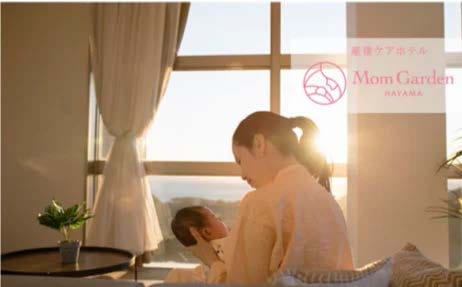
MARM GARDEN HAYAMA" is a "place where you can slowly become a mother" to reduce the various stresses and physical burdens of postpartum mothers and parents. By facing childcare with professional support during the mentally unstable period after childbirth, you can gradually get used to the position of "mom" without being rushed. In order for parents to get a good night's sleep and rest, a baby room is available for 24-hour care of red and white babies. Midwives and pro-treatment staff are available to watch over the baby when necessary. Your partner can also stay with you, and we will teach you how to take care of your newborn, such as how to bathe him or her.
Location: 1-4-3 Shonan Kokusai-mura, Yokosuka-shi, Kanagawa 240-0107
Access: 30 minutes from Yokohama by car, 1 hour from Tokyo
Facilities: Baby room, bathing space, nursing space, foot bath, bedrock bath, herb tent, esthetic salon, private bath, mums' class room, newborn photo space, restaurant, lounge, work space, karaoke, laundry, kids' space
Included lessons: lactation guidance, bathing guidance, breast care, childcare lectures, etc.
Reservations: Please make reservations through the official LINE. https://liff.line.me/1656180762-X7Omwovw/landing?follow=%40908enbcs&lp=x3lRLa&liff_id=1656180762-X7Omwovw
Official site:https://www.mom-garden.jp/
Official NOTE:https://note.com/mom_garden
Official Instagram:https://www.instagram.com/mom_garden_hayama/
■Company Profile
Company name: MUM'S Corporation (Holdings Company, NS Group Inc.)
Representative Director: Mutsumi Saito
Head office: 1-8-8-8 Ookubo, Shinjuku-ku, Tokyo 169-0072, Japan
Establishment of the Group: September 1986
Business activities: Childcare, postpartum care hotel, restaurant, hotel, bridal, karaoke

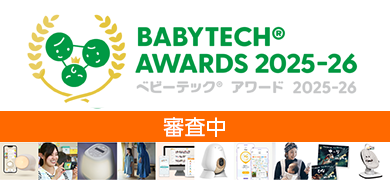
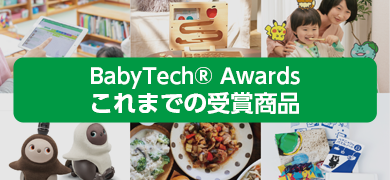
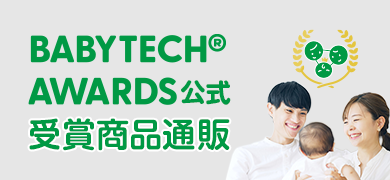
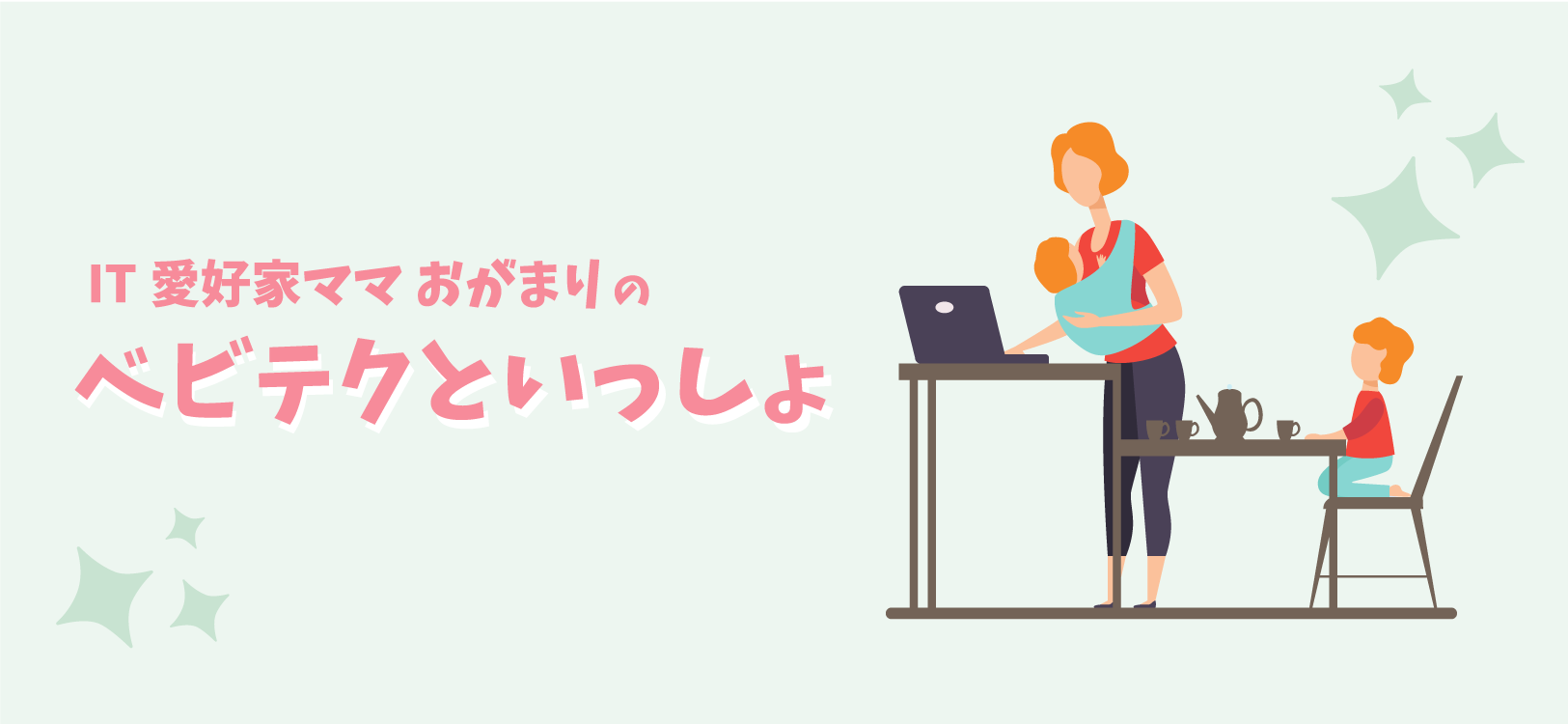

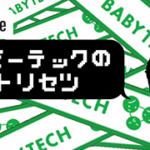
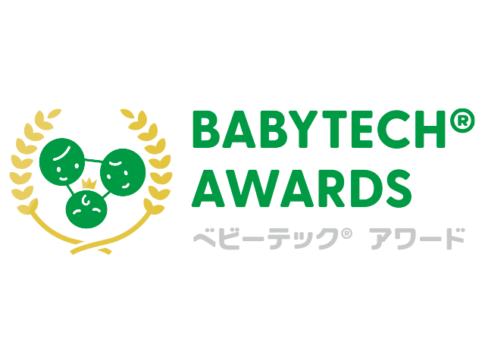
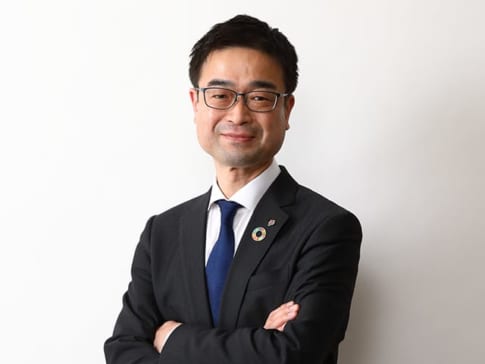
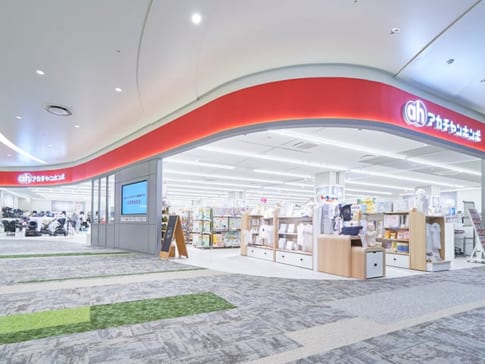
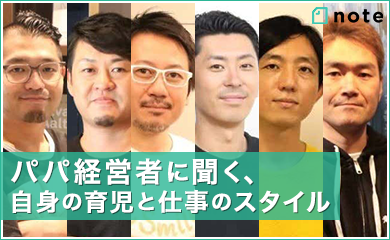
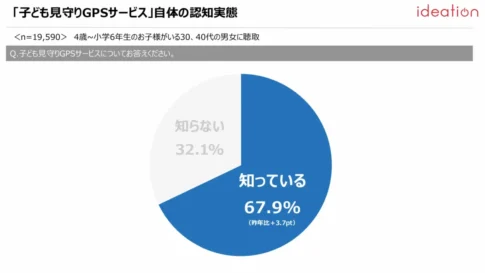

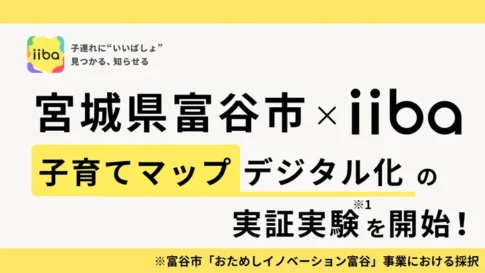
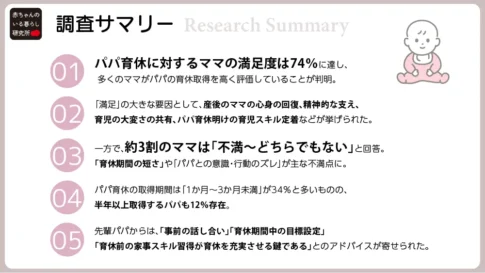
Mums Co., Ltd. which operates Japan's largest postpartum care hotel, "Mum's Garden HAYAMA," conducted a survey on childbearing attitudes among women who will graduate in 2011. Despite a continuous decline in the birth rate, approximately 70% of the respondents expressed a desire to have children in the future. In addition, more than 70% had concerns about childbirth, postpartum, and childcare, and close to half of the respondents were aware of the availability of childbirth-related benefits as an axis for selecting a company to work for, while the availability of postpartum care hotels made them feel more positive about childbirth.
Let's take a look at the details from the press release.